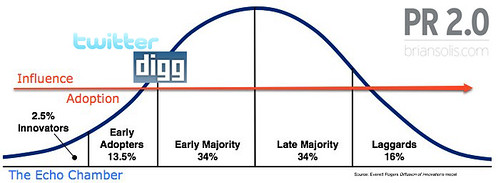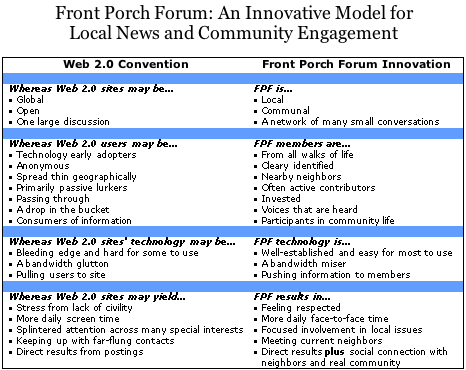Category Archives: MacArthur Fellows
Challenging Conventional Web 2.0 Wisdom
A friend jokingly refers to Front Porch Forum as the “anti-internet” and he got me thinking. I ended up with the chart below comparing conventional wisdom for much of “Web 2.0” vs. FPF.
FYI, Front Porch Forum hosts networks of online neighborhood forums that blanket metro areas. In our Chittenden County, VT, pilot, 11,000 households subscribe, including one-third of Burlington. People connect with neighbors and build community through the exchange of postings among clearly identified nearby neighbors.
So, Peter Kafka got me thinking more with his post on Silicon Alley Insider the other day, in particular this gem…
It’s counterintuitive, but during an up cycle people accept conventional wisdom, and during a down cycle people challenge it. That’s good. Very good. And the cycle will winnow competition.
Well… an upside to our economic crisis! A year ago during good times a few Web 2.0 experts took a look at Front Porch Forum and each, in his way, told us that we needed to get in line and look more like the left column above. And just in the past week I’ve heard from some folks in the same crowd and they’re showing up with open minds and probing questions.
Riding the adoption bell curve
A posting on TechCrunch came with this nifty illustration about adoption of new online services the other day…
… customers and word-of-mouth referrals travel from left to right along a bell curve that starts with Innovators and Early Adopters, peaks with the Early Majority and the Late Majority, and finally permeates with reaction from Laggards.

If I read this right, the author is claiming that Digg and Twitter have about 16% market penetration. In a previous posting here, it was noted that Digg has 30 million monthly visitors, with 3 million of them registered users. Considering just the U.S. population (300 million), wouldn’t that put Digg between 1% and 10% penetration? That is, still far from moving out of the Early Adopter range?
Nearly 20% of our pilot area subscribes to Front Porch Forum, including 33% of Burlington and better than 90% of our leading neighborhoods. That puts the bulk of our service in the Early Majority area, with our best neighborhoods pushing through the Late Majority and into the Laggards.
Web 2.0 for the rest of us?
reports today on CNET News…
LONDON–Digg founder Kevin Rose had a message for the audience at the Future of Web Apps conference on Thursday: It’s time to grow up.
“We have to do better,” he said in his talk, called “The Future of News,” and said that it’s time for the social news site that he founded in 2004 to to expand beyond the geek set and get some real-world relevance. “Why click a button and make the number go up by one? Why does that matter?”
Digg, after all, gets more than 30 million monthly visitors, but Rose said that the site only has slightly over three million registered user accounts–those are the people actually “Digging.” That indirectly confirmed what Digg critics hve been saying all along: that it’s reflective of only a tiny and vocal subset of the Web, resulting in a heavy bias toward anything iPhone, anything Linux, anything Barack Obama, and plenty of wacky local news stories.
I’ve been fortunate to speak to many groups over the past year or so, and I frequently survey each crowd about technology and services that they’ve (1) heard of, and (2) use. Routinely, only one or two hands will go up for Twitter, RSS, LinkedIn, Digg, Flickr, Delicious, etc. to my first question. But almost no one ever admits to using these tech media darlings. Meanwhile, it’s not unusual in talks with local groups within our pilot area to have half of the hands reaching for the ceiling when I ask about Front Porch Forum.
Kevin Rose’s call above seems on target to me. When you offer a service globally, it’s not outrageous to find a million tech professionals and hobbyists to jump on board. But try raising an online crowd within a local community… especially one that stays plugged in over time… very difficult.
In our pilot area, more than 11,000 households subscribe to Front Porch Forum, including one-third of Burlington, VT. We have people in their 80s using FPF. I spoke with a homeless person the other day who’s on board. College students love FPF. And we have droves of non-techie grown-ups… folks who are too busy with their lives to look into why they should tweet or digg. Busy or not, they do know that Front Porch Forum is the place to turn to borrow a couple saw horses, find a babysitter, recommend a roofer, learn about a rash of break-ins, give away their couch, buy a bike, hear from their school board member about the budget, etc.
I’m looking forward to more online offerings aimed at the rest of us… not just the heavy tech consumers. Of course, it’s tough for the traditional and new media, as well as funders, not to be dazzled by shiny bells and whistles, especially when these sites attract a sizable group of early adopters from the global masses. This top-down approach has worked incredibly well for Google and a host of others. And it will continue to draw most of the media spotlight and funding.
I’m eager to see more efforts coming from the other direction — the grassroots on up and out — such as we’re doing with Front Porch Forum… the Craigslist and Angieslist approach. That is, get traction in one metro area, then spread to others.
Financial blow softened for those who’ve invested in community
Millions of middle class Americans are watching their savings shrink dramatically in the Wall Street debacle unfolding before us. Much is being written and said about it all… lots to digest.
But one angle I’ve not come across yet is the strategy that a small but growing number of people are employing… to invest more personal resources into building community, even at the sacrifice of their short-term savings. Put another way… to shift financial capital into social capital.
When hard times come, having plenty of cash helps, of course. But so does having a strong community. Having a network of close local friends, living in a supportive neighborhood, being part of a stable town with good schools… all of these “assets” can help cover real needs.
Front Porch Forum is in this business. It helps people invest in community and realize genuine gain from it… economic, social, emotional, and more. More later…
PBS offers Examples of New Media aiding Local Communities
Mark Glaser, New Media Expert for PBS, offers examples of the internet serving local communities…
That’s heady company for FPF… two nationally known Knight Foundation grant recipients. Everyblock and Spot.Us are both exciting projects. See Mark’s comments for yourself…
Information + Communication + Civic Engagement = ??
Keith Harris in the United Kingdom writes today that “What’s missing is communication, not information” on his blog Neighbourhoods. Some of his points…
This is very definitely work in progress but maybe the argument is something like this:
- for various reasons there is a crisis of local social connections which causes evident damage
- examples of local communication (post-its on windscreens, notes on lamp-posts, message graffiti and so on) point to the inadequacies of existing communication channels, especially in contexts of high mobility and the erosion of local life
- online networks can augment (not replace) other channels of communication and stimulate more interaction (I never understood why this should ever have been in doubt)
- we need to find out what research has been done and where the gaps are, showcase good practice and clarify the lessons. This will help the system-builders, and then
- we have to go to to the housing movement and local government with incontestible arguments that this stuff works and should be developed. Might that do it?
This reminds me of some of the conversation that the Knight Foundation has been sparking through its various efforts. Knight is pushing easily accessible information at the local level as a needed element to sustain our democracy in the United States. Hear, hear! But others, including me, have pushed to have civic engagement be part of that mission as well. And here’s Keith telling us that communication trumps information.
I think we need all three to feed our democracy… an engaged citizenry that can communicate with each other and develop, access and share information. I’m thrilled that Front Porch Forum is on the cutting edge of all this.
About Blog
Ghost of Midnight is an online journal about fostering community within neighborhoods, with a special focus on Front Porch Forum (FPF). My wife, Valerie, and I founded FPF in 2006... read more
Post Categories
- Uncategorized
- PDF2009
- Calendar
- Northeast Kingdom
- podcast
- Peer Rental
- Localization
- Big Tech
- Events
- PDF2007
- Web Traffic
- Google AdSense
- Pay It Forward
- Elections
- berkmansunlight
- Maps
- Video
- Upstate New York
- Coupons
- Wildlife
- Mobile
- Viral Marketing
- Raffle
- Crisis Response
- Donations
- Lost & Found
- Real Estate
- College Students
- Gratitude
- Social Responsibility
- Orton Family Foundation
- Start ups
- Make It Your Own Awards
- Online Civility
- Clay Shirky
- Newspapers
- Humor
- How To Use FPF
- Online Classified Ads
- Best of FPF
- Peer Reviews
- Politics
- Community Management
- Economic Development
- Local Reviews
- Case Foundation
- Borrow and Lend
- Neighborhood Watch
- Good Government
- Small Business Advertising
- Citizen Journalism
- e-Vermont
- Democracy
- Local Search
- Knight Foundation
- Burlington
- MacArthur Fellows
- Civic Engagement
- Social Media
- social capital
- Social Networking
- Vermont
- Neighborhood
- Community Building
- Local Online
- Front Porch Forum

 First, the RTC People’s Choice Award — Most Innovative, which included a $500 check. And then, the real shocker, the RTC Champion Award ($3,000)… this is the top national award from the
First, the RTC People’s Choice Award — Most Innovative, which included a $500 check. And then, the real shocker, the RTC Champion Award ($3,000)… this is the top national award from the